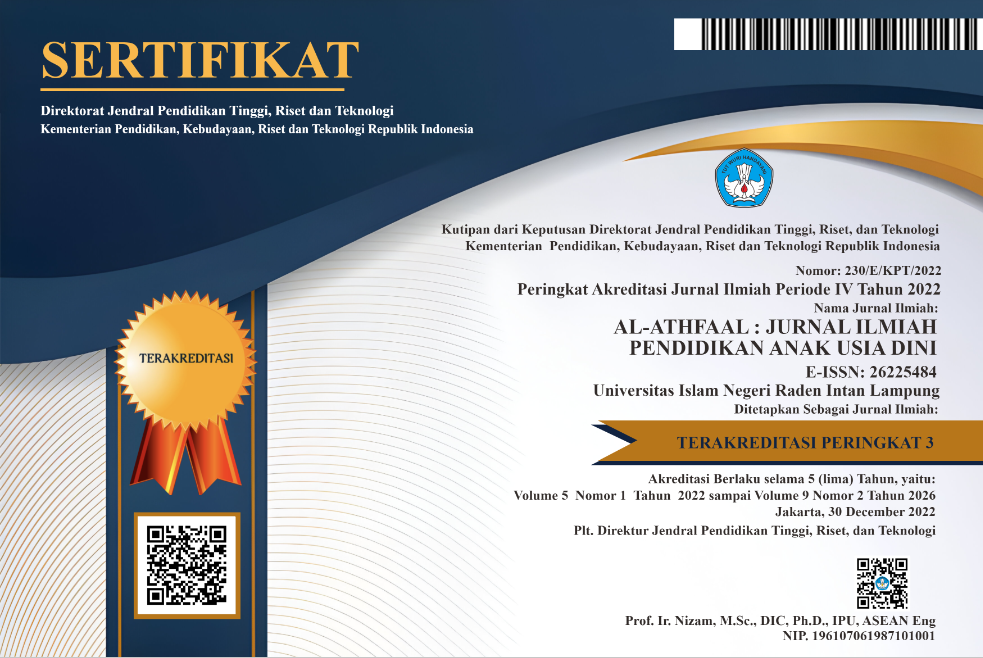The validity of coping skills learning media to manage negative emotions for children
Abstract
Coping or problem-solving skills need to be trained from an early age. If the child does not have positive coping skills, it is feared that it can cause the child to become maladaptive and stressed. This research aims to test the validity of the learning media for coping skills to manage negative emotions for children aged 4-6. The learning media guidebooks and supporting products, such as posters, emoticon pictures for jumping activities, pictures of emotional expressions, story books, cartoon films, and children's activity sheets. This learning media has a novelty because it focuses on developing media based on children's coping skills that did not exist before. This research is quantitative. This research conducted expert validation to obtain validation and then analyzed quantitatively descriptively. The researcher calculated the validation results with Aiken's V formula. Based on the assessment results from experts, it can be concluded that the learning media for coping skills to manage negative emotions for children aged 4-6 years is declared valid. All items are considered valid because Vtable is 5% greater than Vcount. Guidebooks and supporting products for coping skills to manage children's negative emotions were declared valid and worthy of use for field trials
Keywords
Full Text:
PDFReferences
Afrianti, N. (2018). Permainan tradisional, alternatif media pengembangan kompetensi sosial-emosi anak usia dini. Cakrawala Dini: Jurnal Pendidikan Anak Usia Dini, 5(1). https://doi.org/10.17509/cd.v5i1.10405
Álvarez, N., Lázaro, M. H., Gordo, L., Elejalde, L. I., & Pampliega, A. M. (2022). Maternal mentalization and child emotion regulation: A comparison of different phases of early childhood. Infant Behavior and Development, 66, 101681. https://doi.org/10.1016/j.infbeh.2021.101681
Anggraini, W., & Kuswanto, C. W. (2019). Teknik Ceklist Sebagai Asesmen Perkembangan Sosial Emosional di RA. Al-Athfaal: Jurnal Ilmiah Pendidikan Anak Usia Dini, 2(2), 61–70. https://doi.org/10.24042/ajipaud.v2i2.5248
Bronfenbrenner, U. (1986). Ecology of the family as a context for human development: Research perspective. Developmental Psychology, 6, 723–742.
Calkins, S. D., Graziano, P. A., Reavis, R. D., & Keane, S. P. (2007). The role of emotion regulation in children’s early academic success. Journal of School Psychology, 45(1), 3–19. https://doi.org/10.1016/j.jsp.2006.09.002
Callear, A., Harvey, S. T., & Bimler, D. (2017). Understanding the structure of children’s emotion-regulation strategies. International Journal of Behavioral Development, 41(3), 456–462. https://doi.org/10.1177/0165025416647525
Carver, C. S., & Connor-Smith, J. (2010). Personality and coping. Annual Review of Psychology, 61, 679–704. https://doi.org/10.1146/annurev.psych.093008.100352
Chalmers, K., Frydenberg, E., & Deans, J. (2011). An exploration into the coping strategies of preschoolers: Implications for professional practice. Children Australia, 36, 120–127. https://doi.org/https://doi.org/10.1375/jcas.36.3.120
Collyer, C., Bell, M. F., & Christian, H. E. (2022). Associations between the built environment and emotional, social and physical indicators of early child development across high and low socioeconomic neighbourhoods. International Journal of Hygiene and Environmental Health, 243, 113974. https://doi.org/10.1016/j.ijheh.2022.113974
D, P., & Friedman, A. (2004). Improving children’s coping with everyday stress: transporting treatment interventions to the school setting. Journal of Clinical Child and Family Psychology Review, 7.
Gardner, A. A., Zimmer-Gembeck, M. J., & Skinner, E. A. (2021). Coping Skills. In Reference Module in Biomedical Sciences. Elsevier. https://doi.org/10.1016/B978-0-12-818872-9.00029-7
Greenhalgh, J., Dowey, A. J., Horne, P. J., Fergus Lowe, C., Griffiths, J. H., & Whitaker, C. J. (2009). Positive- and negative peer modelling effects on young children’s consumption of novel blue foods. Appetite, 52(3), 646–653. https://doi.org/10.1016/j.appet.2009.02.016
Haselgruber, A., Sölva, K., & Lueger-Schuster, B. (2020). Perspective matters: Differences between child- and caregiver-reports of emotion regulation mediating the relationship between cumulative childhood trauma and mental health problems in foster children. Child Abuse & Neglect, 107, 104558. https://doi.org/10.1016/j.chiabu.2020.104558
Hentges, R. F., Graham, S. A., Plamondon, A., Tough, S., & Madigan, S. (2021). Bidirectional associations between maternal depression, hostile parenting, and early child emotional problems: Findings from the all our families cohort. Journal of Affective Disorders, 287, 397–404. https://doi.org/10.1016/j.jad.2021.03.056
Hoffmann, J., & Russ, S. (2012). Pretend play, creativity, and emotion regulation in children. Psychology of Aesthetics, Creativity, and the Arts, 6(2), 175–184. https://doi.org/10.1037/a0026299
Jiang, Z., Waters, A. C., Liu, Y., Li, W., & Yang, L. (2017). Event-related theta oscillatory substrates for facilitation and interference effects of negative emotion on children’s cognition. International Journal of Psychophysiology, 116, 26–31. https://doi.org/10.1016/j.ijpsycho.2017.02.012
Joyce, B., Weil, M., & Calhoun, E. (2015). Models of teaching. (Ninth Edition). Pustaka Pelajar.
Khusniyah, N. L. (2018). Peran Orang Tua sebagai Pembentuk Emosional Sosial Anak. QAWWAM, 12(1), 87–101. https://doi.org/10.20414/qawwam.v12i1.782
Li, D., Li, D., Wu, N., & Wang, Z. (2019). Intergenerational transmission of emotion regulation through parents’ reactions to children’s negative emotions: Tests of unique, actor, partner, and mediating effects. Children and Youth Services Review, 101, 113–122. https://doi.org/10.1016/j.childyouth.2019.03.038
Lin, Y.-W., & Sue C. Bratton. (2015). A meta‐analytic review of child‐centered play therapy approaches. Journal of Counseling & Development, 1, 45–58.
Lind, T., Bernard, K., Ross, E., & Dozier, M. (2014). Intervention effects on negative affect of CPS-referred children: Results of a randomized clinical trial. Child Abuse & Neglect, 38(9), 1459–1467. https://doi.org/10.1016/j.chiabu.2014.04.004
Ma, Y., Wang, E., Yuan, T., & Zhao, G. xiang. (2016). Location negative priming effects in children with developmental dyslexia: An event-related potential study. Research in Developmental Disabilities, 55, 88–99. https://doi.org/10.1016/j.ridd.2016.03.017
Martani, W., & Psikologi, F. (2012). Metode Stimulasi dan Perkembangan Emosi Anak Usia Dini. Juni, 39(1), 112–120.
Muthmainah, M. (2022). Persepsi Guru tentang Keterampilan Koping untuk Mengelola Emosi Anak Usia 4-6 Tahun. Jurnal Obsesi : Jurnal Pendidikan Anak Usia Dini, 6(3), 2304–2315. https://doi.org/10.31004/obsesi.v6i3.1968
Nugraha, A., & Rachmawati, Y. (2011). Metode pengembangan sosial emosional. Universitas Terbuka.
Pang, D., Frydenberg, E., Liang, R., Deans, J., & Su, L. (2018). Improving Coping Skills and Promoting Social and Emotional Competence in Pre-Schoolers: A Pilot Study on COPE-R Program. Varhaiskasvatuksen Tiedelehti Journal of Early Childhood Education Research, 7(2), 362–391. http://jecer.org
Prado, E. L., Sebayang, S. K., Adawiyah, S. R., Alcock, K. J., Ullman, M. T., Muadz, H., & Shankar, A. H. (2021). Maternal depression is the predominant persistent risk for child cognitive and social-emotional problems from early childhood to pre-adolescence: A longitudinal cohort study. Social Science & Medicine, 289, 114396. https://doi.org/10.1016/j.socscimed.2021.114396
Schaefer, C. E. (Ed. ., & Inc, J. W. & S. (2011). Foundations of play therapy, 2nd ed. American Journal Association.
Sugiyono. (2010). Metode penelitian kuantitatif kualitatif dan R&D. Penerbit Alfabeta.
Sun, J., Singletary, B., Jiang, H., Justice, L. M., Lin, T.-J., & Purtell, K. M. (2022). Child behavior problems during COVID-19: Associations with parent distress and child social-emotional skills. Journal of Applied Developmental Psychology, 78, 101375. https://doi.org/10.1016/j.appdev.2021.101375
Taylor, E., Verhulst, F. C., Wong, J., & Yoshida, K. (2020). Mental health and illness of children and adolescents. . . Singapore: Springer.
Wang, L., Chen, Y., Zhang, S., & Rozelle, S. (2022). Paths of social-emotional development before 3 years old and child development after 5 years old: Evidence from rural China. Early Human Development, 165, 105539. https://doi.org/10.1016/j.earlhumdev.2022.105539
DOI: http://dx.doi.org/10.24042/ajipaud.v5i1.11966
Refbacks
- There are currently no refbacks.
Copyright (c) 2022 Al-Athfaal: Jurnal Ilmiah Pendidikan Anak Usia Dini
License URL: https://creativecommons.org/licenses/by-sa/4.0
 All publications by Al-Athfaal: Jurnal Ilmiah Pendidikan Anak Usia Dini [p-ISSN: 2622-5484, e-ISSN: 2622-5182] are licensed under a Creative Commons Attribution-ShareAlike 4.0 International License.
All publications by Al-Athfaal: Jurnal Ilmiah Pendidikan Anak Usia Dini [p-ISSN: 2622-5484, e-ISSN: 2622-5182] are licensed under a Creative Commons Attribution-ShareAlike 4.0 International License.












